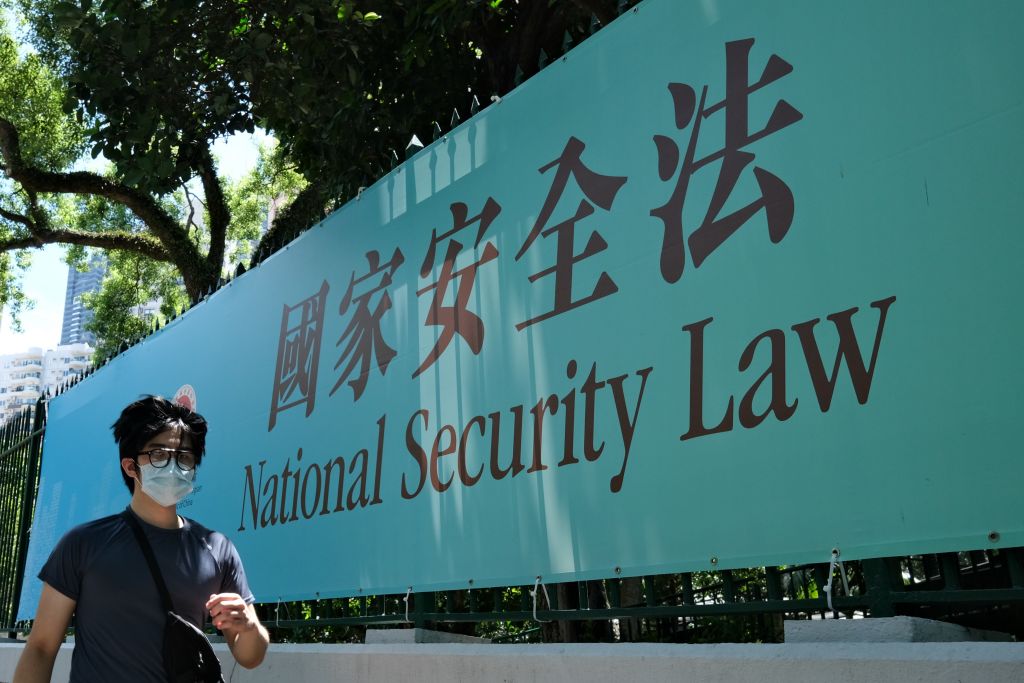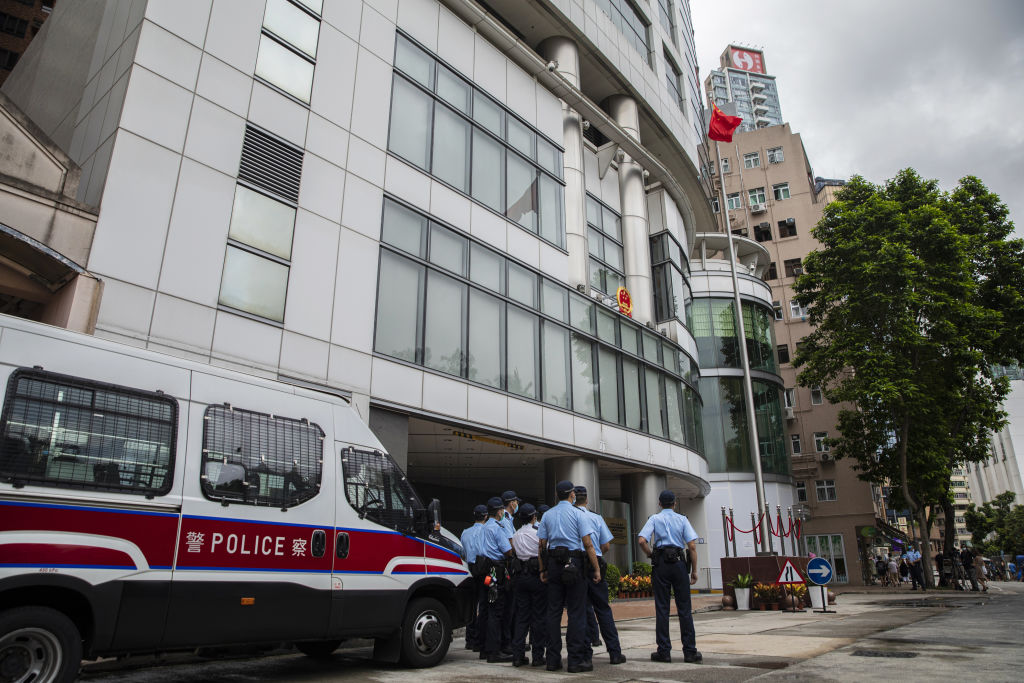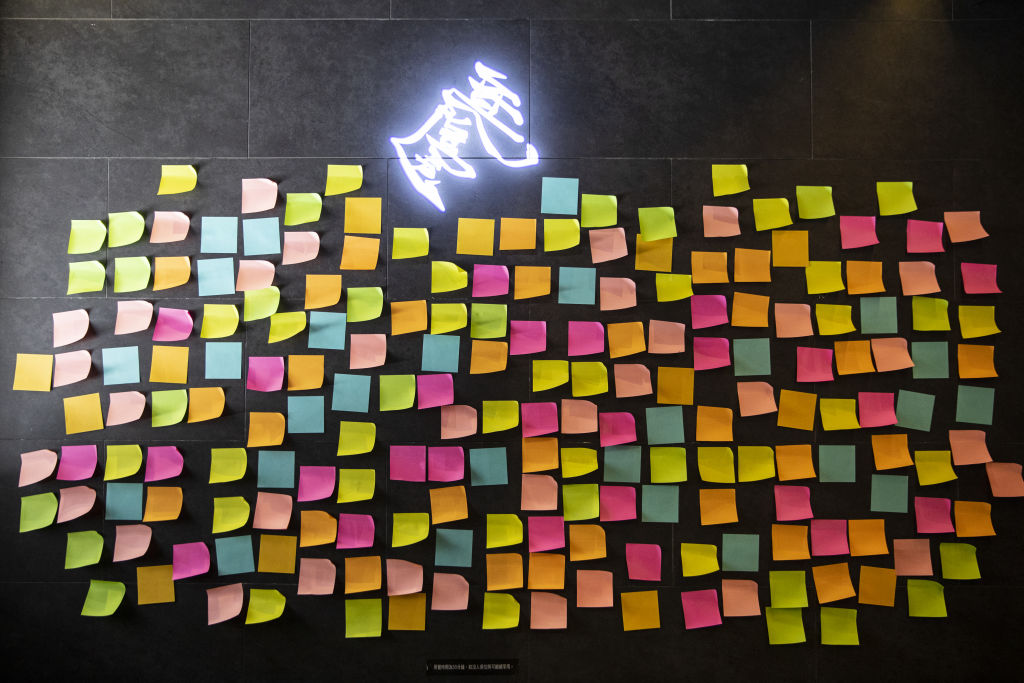
After more than a decade, Martin suddenly quit writing his column. He said goodbye to his readers, editors and colleagues. But he did not name the fear that prompted him to abandon his commentaries—at least not until he left Hong Kong.
“The day [the national security law] passed I just couldn’t write anything. I stared at the screen for hours,” he messaged TIME from onboard his flight out of the semi-autonomous enclave. “I hate self-censorship, so I’d rather call this an end.”
Martin, who asked that his real name not be used because he needs to return in the future, is hardly the only one to fall silent rather than risk tangling with the draconian new restrictions.
In the three and a half weeks since the enactment of the law at the end of June, a sense of fear and uncertainty has taken hold in Hong Kong, where anything seen to provoke hatred against the Chinese government is now punishable with up to life in prison. Some people have redacted their social media posts and erased messaging app histories. Journalists have scrubbed their names from digital archives. Books are being purged from libraries. Shops have dismantled walls of Post-it Notes bearing pro-democracy messages, while activists have resorted to codes to express protest chants suddenly outlawed.
The first arrests came just hours after the law was implemented. On July 1, the 23rd anniversary of Hong Kong’s return to China from Britain, hundreds of protesters were rounded up for unauthorized assembly amid the coronavirus pandemic. Ten, including a 15-year-old girl and a 23-year-old motorcyclist who drove into police, were accused of breaching the new law, mostly by carrying separatist stickers and pro-independence flags.
In at least one respect, the regulations are already proving successful: the sometimes violent demonstrations that flared across the freewheeling Asian financial capital over the past year have largely evaporated. The unrest, which seized university campuses, paralyzed public transportation and brought police and petrol bombs into residential neighborhoods, wrought millions of dollars in damages and plunged Hong Kong into a recession. It also challenged Beijing’s bottom line as the movement morphed into an open challenge of the Chinese Communist Party’s authority, with demonstrators sporting American flags, beseeching foreign governments to intervene and increasingly chanting, “independence, the only way out.” Their fight brought this previously stable financial capital directly into the crux of imploding U.S.-China relations.
To Beijing, the legislation is necessary to secure its sovereignty over the territory. “People in Hong Kong can still criticize the Communist Party of China after the handover,” Zhang Xiaoming, deputy director of the Chinese government’s Hong Kong and Macau Affairs Office, reportedly said at a press conference earlier this month. “However, you cannot turn these into actions.”
Read more: Hong Kong Is Caught in the Middle of the Great U.S.-China Power Struggle
Some hope the crackdown will only be temporary as Beijing restores stability. But others fear the far-reaching new law marks the arrival of authoritarian control in a city that has long cherished its freedoms and independent judiciary.
“Overnight, Hong Kong has gone from rule of law to rule by fear,” says Lee Cheuk-yan, a veteran activist and former legislator.
Lee chairs the Hong Kong Alliance in Support of Patriotic Democratic Movements in China, which established the world’s only museum dedicated to the 1989 Tiananmen Square protest movement in Beijing. Afraid the museum, and its advocacy of an end to one-party rule in China, may fall foul of the new law, the alliance is rushing to raise $200,000 to digitize its archives.
While Lee and his colleagues discussed moving the artifacts abroad, including video footage and items donated by mothers of students killed in the bloody military crackdown, doing so seemed like handing victory to the Chinese government and its attempt to erase the event from collective memory. But keeping the operation running is now a game of dramatically higher stakes.
“Our worry is that the law is so vague about everything and so broadly defined that we don’t know how they will categorize our organization,” Lee says. “Will they strike at us?”
That sense of foreboding hangs over many organizations as they speculate what might make them a target.

‘We should all be making plans’
Drafted in secret, the law only became public as it took effect shortly before midnight on June 30. By morning, boats bearing giant red and yellow banners sailed across Victoria Harbor heralding the new legal regime.
Though the new measure specifically bans subversion, sedition, terrorism and collusion, several lawyers who are experts in Chinese law told TIME the phrasing of these crimes can be interpreted so expansively as to apply to almost any activity or speech. On the mainland, similar charges are routinely wielded to crush even moderate dissent.
“It’s so much worse than anyone expected. It can encompass all the acts we have been doing in the protests over the last year,” says Lee, who is facing multiple charges of unlawful assembly stemming from before the law’s enactment.
The Hong Kong government insists the new law will only affect a small minority of people, and that the city’s free speech is not under threat. But officials also say that the law encompasses popular protest slogans, including “Liberate Hong Kong” and “Hong Kong Independence,” that are now deemed to be inciting others to commit secession or subverting state power.
It remains unclear how far the law’s 66 provisions—which touch on education, media, non-governmental organizations, universities, the internet, social organizations, international organizations, elections and more—will extend.
“Each day the government announces something new about this law,” says Fung Wai-wah, president of the pro-democracy Professional Teachers’ Union. “The red line is still moving.” Stoking concern for academic freedom, schools have been told to review course materials, books and libraries to ensure nothing is in violation. “This censorship is as irrational as it is ambiguous,” Fung adds.
For the first time, Chinese security agents will operate openly in Hong Kong, while the most serious offenders may be extradited for trial in the Communist Party-controlled courts on the mainland. Simon Young, associate dean of the University of Hong Kong’s law school, suspects that if such extradition powers are used “It may well be that we don’t know until after the person has entered the mainland jurisdiction. It’s certainly something that keeps us guessing and in fear.”
The city’s top official, Chief Executive Carrie Lam, denies there is “a wide spread of fears [sic]” among Hongkongers, even as a Chinese government official warned the law is intended to act like “a sharp sword hanging high” over the heads of potential offenders.
“This is not just a new law, it’s really a new order in Hong Kong,” says Fred Rocafort, a former diplomat and legal expert on China at law firm Harris Bricken. He expects “relatively constant applications of the law for even relatively minor acts” as this state of affairs is established.
Read more: ‘Hong Kong Is Freer Than You Think’
Some see a deliberate deterrent effect in the law’s ambiguity.
“The whole purpose is to incept people’s minds so they have to ask the question of whether everything they do is maybe a violation,” says Peter Yam, a film producer currently working on an independent documentary about the Hong Kong protests.
While the subject matter could be considered incendiary in the current political climate, Yam says he and the crew have discussed the law and don’t want to focus on it. “If our films are put under review and censored then there’s nothing we can do,” he says.
Since the law was enacted, Yam has received a stream of messages from friends and colleagues debating whether it’s time to leave the city for good.
“I want to stay until the last moment,” he says. “At the same time, we should all be making plans.”
While Australia, Taiwan and the U.K. are all offering avenues for fleeing Hongkongers, many of the 7.4 million residents of one of the world’s most starkly unequal cities cannot afford an exit strategy. Those who stay will have to navigate what it means to lose some of the liberties that distinguished their home from the mainland.
In 1997, the former British colony was grafted back onto China under a political formula known as “one country, two systems,” designed to preserve its separate legal and political systems within an authoritarian state. The conceit meant Hong Kong was the only place in China where calls for political reform could be full-throated, and the color and vulgarity of anti-government invectives were limited only by imagination. Here, publishers hawking banned books and practitioners of the outlawed Falun Gong spiritual movement could promote literature inaccessible just over the border. Unfettered by censorship, the hard-bitten local press documented any perceived interference by Beijing.
Lam, the city’s leader, said she could guarantee the press would not be targeted by the new law only if all reporters also gave “a 100% guarantee that they will not commit any offenses under this piece of national legislation.”
Rachel Cartland, a former civil servant and long-time guest presenter for Hong Kong’s public broadcaster RTHK, found the government’s statements less than reassuring. She announced she was stepping down from a radio program over the new law, just days after its enactment.
“I put aside this thought of, well, ‘How likely are they to come after me?’ and just looked at it dispassionately,” she says. “People are really going to have to think through: how is this going to affect me?”
‘The cost of politics will be much higher’
The government is expected to “strengthen the management” of foreign nongovernmental organizations and news agencies, according to the law, a condition that has prompted deep concern and expedited corporate relocation plans. On July 14, the New York Times announced it was shifting its Hong Kong-based digital news operation to South Korea, citing visa problems and the city’s “new era under tightened Chinese rule.”
The police force has also been given sweeping new powers to regulate online content and intercept communications. Companies may be compelled to remove content deemed a threat to national security and to handover private user data. In response, tech giants like Facebook and Google announced a pause on data requests from Hong Kong.
Meanwhile, primary elections held by pro-democracy parties mid-July could be considered a violation of the national security law by way of “subverting state power.” (The government alleges that the primaries were potentially subversive because the stated aim of many candidates, if elected, will be to veto the government’s budget and legislation, even though such deadlocking is permitted under the city’s mini-constitution.) Organizers claim that more than 600,000 cast ballots in the two-day vote, with results favoring young democrats who tend to be more confrontational toward the Chinese government. It’s unclear if these candidates, many of whom protested the new law, will face disqualification or other repercussions.
Read more: ‘One Country, Two Systems Is Still the Best Model for Hong Kong But It Badly Needs Reform‘
“The cost of politics will be much higher than before,” says Tanya Chan, a lawmaker and convenor of the pro-democracy camp. Her book was one of several removed from circulation at the public libraries pending a review. The targeting of her travelogue was “puzzling,” she says, though she expects that “sooner or later” this law “will affect almost every aspect of our normal life.”
Some groups have preemptively disbanded. Demosisto, the youth political party founded by prominent activist Joshua Wong, ceased to be on the same day the law was enacted, while other upstart political organizations relocated overseas.
Nathan Law, a co-founder of Demosisto—and frequently vilified in Chinese state media as a conspirator of foreign governments over his lobbying for U.S. sanctions on Hong Kong—went into self-imposed exile in London a day after he testified online to a congressional hearing.
“It has created a chilling effect,” says Law, “and destroyed the Hong Kong that we used to know.”
But for some, exasperated by the violence and disruption of last year’s protests, the law brings welcome tranquility back to Hong Kong’s streets.
Ronny Ng, a 52-year-old IT professional, says he was tired of not being able to go out or get to work as protest after protest transformed his neighborhood into a battlefield. “If you’re not against the government or against China, the new law won’t be a problem,” he says while on a cigarette break outside his office. Those who are, he admits, “should probably leave if they can’t adapt.”

Among businesses in the financial center, reactions have been mixed. After the details were revealed, a survey by the American Chamber of Commerce showed the majority of U.S. companies operating out of the hub were increasingly concerned, especially about the law’s ambiguity. Yet an exodus seems unlikely, with 51% of respondents also expecting it would have either no effect or even a positive effect on their operations, given the suspension of protests.
Still, resistance hasn’t been fully extinguished. Demonstrators have already found cheeky ways to circumvent the law, like using numbers, acronyms and homonyms instead of the words in the outlawed protest chant. The Post-it Note walls have returned, although they no longer carry any messages. Blank paper has become the latest marker of defiance. So too have the opening lines of China’s national anthem: “Arise, ye who refuse to be slaves!”
Ahead of the new law’s implementation, some journalists and academics had predicted the “death” of Hong Kong. But Yam, the film producer, insists this not the end of his beloved city.
“I’ve never seen Hong Kong so vibrant in a way,” he says while on a lunch break during one of the last days of filming. “It turns out we really want freedom.”
More Must-Reads From TIME
- The 100 Most Influential People of 2024
- How Far Trump Would Go
- Scenes From Pro-Palestinian Encampments Across U.S. Universities
- Saving Seconds Is Better Than Hours
- Why Your Breakfast Should Start with a Vegetable
- 6 Compliments That Land Every Time
- Welcome to the Golden Age of Ryan Gosling
- Want Weekly Recs on What to Watch, Read, and More? Sign Up for Worth Your Time
Write to Laignee Barron / Hong Kong at Laignee.Barron@time.com